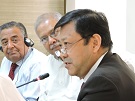A delegation of China Institutes of Contemporary International Relations (CICIR), led by its President Prof. Ji Zhiye, including Mr. Han Liqun and Mr. Hu Shisheng, among others, visited the VIF on 5 August 2016 for an interaction on India-China relations and the way forward. Issues that came up for detailed discussions included: macro economic trends of China and India and the prospects for economic cooperation between the two countries, infrastructure developments in the disputed Pakistan Occupied Kashmir (POK) as spin-off of China-Pakistan Economic Cooperation (CPEC), prospects for stability in the Af-Pak region in the backdrop of China seeking to play an intermediary between the Taliban and the Afghan government, and the implications of recent ruling by the Permanent Court of Arbitration (PCA) in the South China Sea dispute involving China and the Philippines.

With General NC Vij, Director, VIF, in the Chair, discussions were moderated by India’s former Ambassador to China, Amb Ashok Kantha, presently a Distinguished Fellow at the VIF, while a broad panel of interlocutors including Amb Kanwal Sibal, India’s former Foreign Secretary and Dean Centre for International Relations and Diplomacy (VIF), Ms. Bidisha Ganguly, Chief Economist, the CII (Confederation of Indian Industry), Mr. Sushant Sareen, Pakistan expert and Senior Fellow (VIF), and Cmde Gopal Suri, maritime expert, among others, traded eloquence with their Chinese counterparts in the invitation-only event.
Part of General NC Vij’s opening remarks, touched on both constants and variables in India-China relationship. While on one hand he stressed on the commonality of interests that merit closer cooperation between two Asian economic giants in the larger interest of the region, on the other hand he took potshots at Chinese submarines prowling in the Indian Ocean as also China’s growing nexus with Pakistan, among other impediments to a smooth conduct of bilateral relationship between the neighbours.

Echoing General Viz’s sentiments, Prof. Ji Zhiye described China-India relationship as one of the defining relationships of the 21st century. He, however, reiterated a well-rehearsed Chinese stand belying expectations for an early settlement of the border dispute. He said that China and India can move ahead on economic cooperation while keeping the border dispute at bay, a view contested strongly by Indian interlocutors. Similarly, the Indian interlocutors were at a loss to understand China’s economic imperatives behind laying out crucial infrastructure projects, parts of planned economic corridors under OBOR that run through Pakistan’s volatile provinces. In the same vein, they expressed dissonance over China treating the entire South China Sea, a global maritime common, as its core interest. The interaction was however frank and candid. Both sides underscored the need to narrow down the differences as they realized the potential for cooperation was great and to their mutual advantages. The Chinese side, in particular, urged the need to explore areas of potential cooperation between the two countries across regional and international forums.






